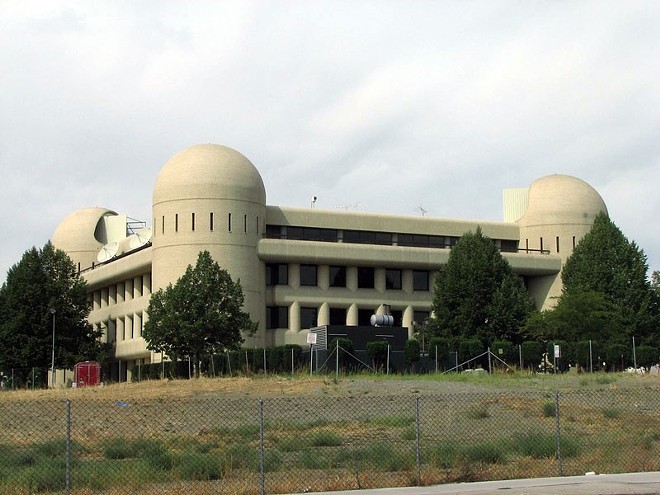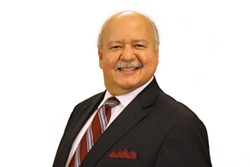When the new Spokane County Health Officer Frank Velazquez initially agreed to take the job last week, he didn't quite know what he was signing up for.
As Velazquez tells it in an interview with the Inlander on Thursday, he got a call from Spokane County Commissioner Al French a couple days before French and the health board voted to fire former Health Officer Dr. Bob Lutz. During the call, French asked Velazquez if he'd theoretically be willing to help the Health District out, should the opportunity arise.
Velazquez agreed, but he says he "didn't know the extent of what I was agreeing to be helpful with."
"At the time I said that, I wasn't sure what I had, in theory, agreed to," Velazquez says. "But he used the magic word, which is, 'Can you help?' and I said, 'yes.'"
Then, on Thursday, Nov. 5 — after hearing why Health District administrator Amelia Clark's reasoning for wanting Lutz gone — French made a motion during the district's board meeting to fire Lutz as Spokane health officer, saying that he believed "it is time for leadership that reflects the values of the board, the agency and the community." In the same meeting, French recommended that the board choose Velazquez as the interim health officer. The board agreed.
(Reached by the Inlander today, French contradicts Velazquez's account. He says he did in fact ask if he'd be willing to become the new health officer last Tuesday, adding, "I don't know what to say" about Velazquez recalling otherwise.)
Today, six days later, Velazquez made himself available for media interviews for the first time since taking over as health officer nearly a week ago. In a 40-minute interview, the Inlander asked him a wide range of questions, from his stance on racial inequities in public health to his plan to reduce the spread of COVID-19 as cases explode locally and nationally.
While Velazquez's views on the importance of masks and social distancing are similar to Lutz, he appears to have more support from Republican politicians like French and Spokane Mayor Nadine Woodward than Lutz.
Woodward — who is not on the health board that fired Lutz, but did publicly clash with him over reopening plans — said Lutz's firing was "the best news I've heard in a long time." Velazquez, meanwhile, donated to Woodward's mayoral campaign. And when she won the election last year, he says he helped pay for a celebration party. (He couldn't recall how much he spent.)
"I don't vote for the mayor. We don't live in the city," Velazquez says.
Here's more on Velazquez's experience, his plans to address the COVID-19 crisis and his views on racial disparities in public health.
PUBLIC HEALTH EXPERIENCE
Velazquez graduated from the Universidad Central del Caribe School of Medicine in Puerto Rico in 1981. He is a physician executive who served for five years as president and chief executive officer of Pathology Associates Medical Laboratories before the company was sold to LabCorp. He currently works as a consultant on various boards for laboratory and diagnostics companies. He's an adjunct faculty member for the Washington State University Elson S. Floyd College of Medicine.
He does not have any direct public health experience. But he does have a master's degree in Healthcare Management and Policy from the Harvard University School of Public Health, which helped give him some "background knowledge" in public health, he says.
"My work has allowed me to be next to it, close to it, and supportive and participate in it without being a public health officer," he says.
He says he's qualified to be an interim public health officer, but he would need to get a master's in public health if he were to serve in the position beyond that.
"I do believe, obviously, that there is some specific experience that health officers may have for a long period of time. Although technically I could take a three-month course and become a public health officer... I can tell you that a three-month course is probably going to be similar to what I did at Harvard, actually," he says.
He says he's not sure how long he will serve as Spokane health officer.
"This is not something that was in my line of sight or radar, or I was searching for. But this is something that's a call of duty for me right now. I feel I need to do it, and I will do it because it's important. And I will do it for however long I'm the right person to do it," he says.
COVID-19 PLAN
COVID-19 is spreading more rapidly than ever both in the Inland Northwest and across the country. Since Friday, the day Velazquez took over as health officer, there have been 1,397 COVID-19 cases in Spokane — including a record 347 on Saturday alone. Hospitalizations are higher than they've ever been, with 75 people in the hospital for COVID-19 as of today.
Velazquez says "the most important thing" the community can do is continue wearing facial coverings, washing their hands and staying away from groups of people.
"It doesn't matter if you're young or older, we're all at risk. We all need to be more careful, so I think the message to the community is: We need to be particularly [careful] going into the winter months, where we're going to stay indoors a lot more. We need to be very vigilant about facial coverings and hand washing."
Currently, Spokane County remains in Phase 2 of Washington's Safe Start Recovery Plan, where the county has been since late spring. Velazquez says the idea of closing businesses like restaurants and gyms again would be "harsh" but says "we'll continue monitoring all of these things." He says it was expected that with more community activity, more cases would come.
When asked if he thinks Spokane is closer to more restrictions in Phase 1 or less in Phase 3, he says, "that's hard to answer."
"Ideally, we don't have to take any steps backwards," he says. "Ideally, we're still looking forward and not back."
Velazquez also sits on the board of Greater Spokane Incorporated, a business development organization. He doesn't think that is in conflict with his position as health officer in making decisions over restrictions on certain businesses. He says his experience may actually help.
"I don't think it's a conflict of interest and, actually, if nothing else, it allows me to really build bridges between organizations," he says.
RACIAL INEQUITIES
As the Inlander wrote yesterday, Lutz apparently ruffled some feathers with SRHD administrator Clark and the Board of Health by appearing at a Black Lives Matter rally on May 31. French suggested it could hurt the "credibility and the integrity of the agency when our health officer is violating the governor's order with regard to stay home." Clark says she received multiple complaints about Lutz's participation.
Lutz has defended his participation by arguing that structural racism is a public health threat. He has noted how people of color disproportionately contract COVID-19 and suffer serious complications from the illness. Those points have been echoed by Washington Secretary of Health John Wiesman.
Velazquez calls Black Lives Matter a political movement that "I may not know enough about" to comment. He says that as a person not born in the United States, he thinks people "should have a voice and should be heard."
"I think what we have seen is that education, socioeconomic status and access [to health care] are directly tied to some of these quote-unquote racial disparities. We see that," he says.
He emphasizes the importance of access to health care, and addressing barriers that might prevent people from accessing it, such as transportation and housing. When asked if he thinks systemic racism is an issue in this country, he calls it "a complicated term." He says he personally has had experiences where people have "looked at him funny because I look a little bit different," but that he focuses on the vast majority of people who accept him for who he is.
When it comes to whether or not he believes systemic racism puts people of color at a disadvantage, leading to more negative public health outcomes, he says "that's something I'm gonna have to think about."
























